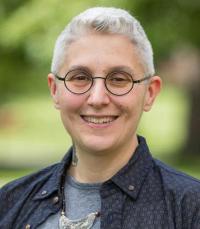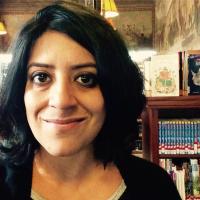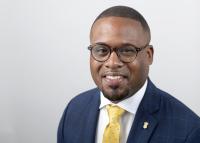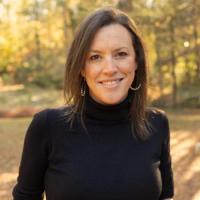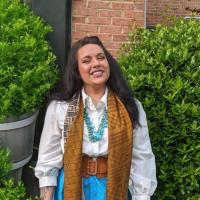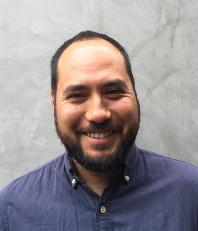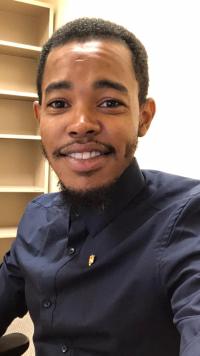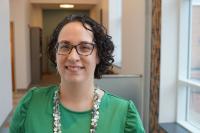Bebe Koch Petrou Displacements Symposium
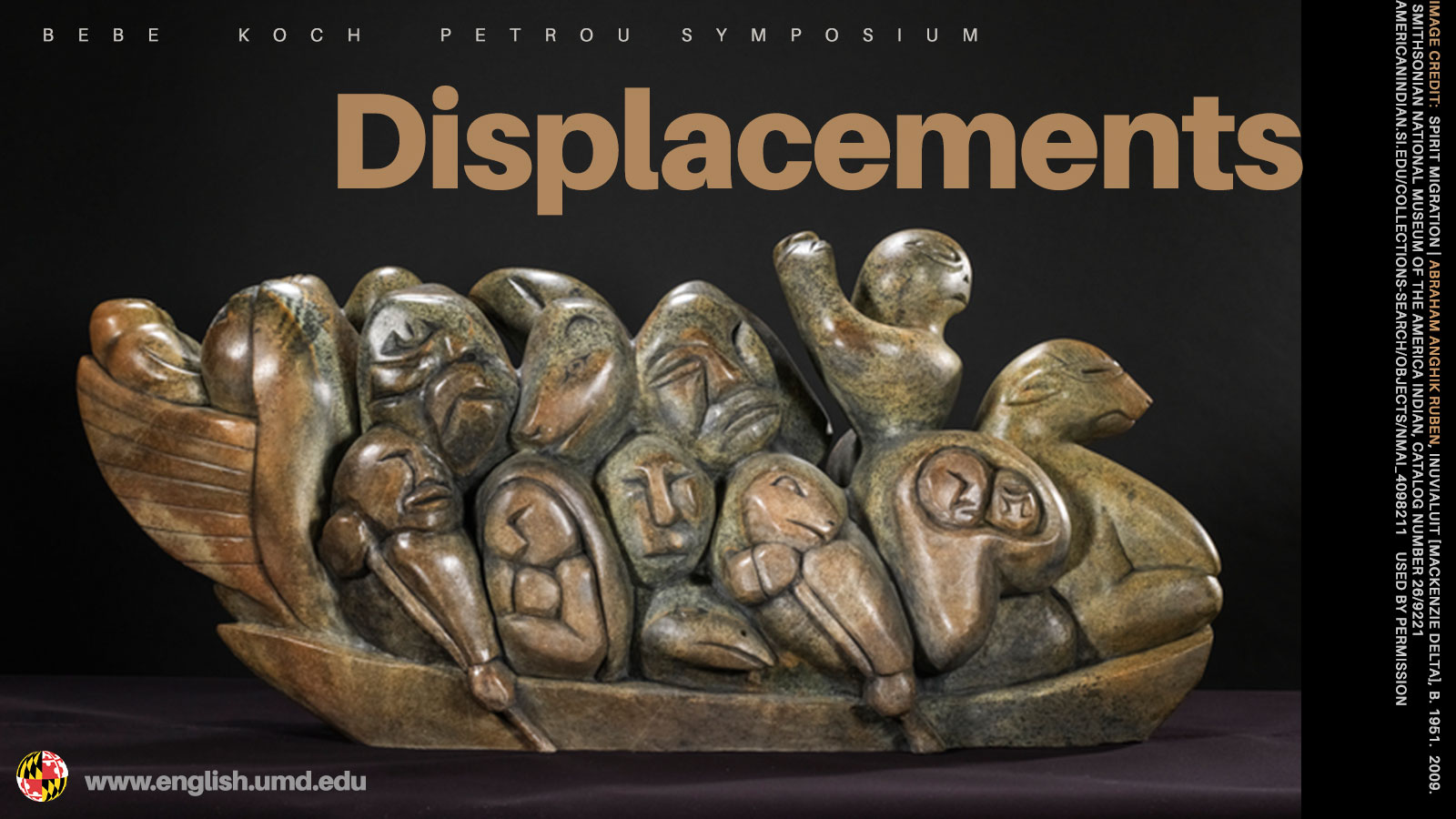
Bebe Koch Petrou Displacements Symposium
An event in the Bebe Koch Petrou Lecture Series
Schedule Overview | Speaker & Session Information | Sponsors
Schedule Overview
Wednesday, March 27, 2024
- 12:00 pm | Welcome Luncheon | Second Floor Lobby, Tawes Hall
- 1:00 pm | Welcome, Introductory Remarks, Panel | 2115 Tawes Hall
- Mrinalini Chakravorty, "Towards Transnatural Displacements"
- Leonard McKinnis, "'To Tell us who We are.': Displacement, Imagination, and Self-Making in Diasporic Black Religions"
- Sarah Quesada, "'Logic of Displacement': Ethnic Particularity and the Ruse of 'Worldliness'"
- 4:30 pm | Reception | Second Floor Lobby, Tawes Hall
- 5:00 pm | Keynote | 2115 Tawes Hall
- Jodi Byrd, "Accumulated Catastrophes"
- Introduction: Chad Infante
- Respondent: Bayley Marquez
Thursday, March 28, 2024
- 9:00 am | Graduate Student Workshop | 2115 Tawes Hall
- 10:30 am | Coffee Service | Second Floor Lobby, Tawes Hall
- 11:00 am | Workshop | 2115 Tawes Hall
- Shelbi Nahwilet Meissner, “Making a Medicine Action Plan: A Social Justice Workshop”
- 1:00 pm | Lunch | Second Floor Lobby, Tawes Hall
- 3:00 pm | Reading | 2115 Tawes Hall
Speaker and Session Information
Plenary Talk: Wednesday, 5:00 pm, 2115 Tawes Hall
Jodi Byrd, "Accumulated Catastrophes"
This talk engages in a conversation about how we understand catastrophe in the present from the multiple catastrophes that began with European arrival to the Americas with conquest and transatlantic slavery as intertwined projects. Discussing theories of racial capitalism in conversation with Black fungibility through Tiffany Lethabo King and Sylvia Wynter, the talk will historicize catastrophe through Southeastern American Indian (specifically my own Chickasaw) histories with Hernando De Soto.
Jodi A. Byrd is an enrolled citizen of the Chickasaw Nation and associate professor of Literatures in English where they also hold affiliations with American Studies, American Indian and Indigenous Studies, LGBT Studies, and Performance and Media Arts. They are the author of Transit of Empire: Indigenous Critiques of Colonialism as well as a number of recent articles in Indigenous feminisms, video game studies, Indigenous queer studies, and settler colonial studies.
Panel. Wednesday, 1:00 pm, 2115 Tawes Hall
Mrinalini Chakravorty, "Towards Transnatural Displacements"
There is a rising global trend of granting constitutional and legal rights to nature. From Ecuador and Bolivia to New Zealand and India, the question of environmental personhood has been taken up by law. The genres of queer eco-art and fiction have also explored the relationality between humans and non-humans through a surreal and transformative poetics. Are rivers persons? Are mountains? If we conceive personhood through strange biospheres, perhaps we can move towards the non-binary reality of the ungendered planet. How might such a queer ecology help to repair the natural world? This talk explores instances of transnatural displacements in postcolonial law, literature, and art to think about harm and repair. It borrows examples from each field to ask how they’re useful for thinking beyond the anthropocentrism of colonial science, with its normative taxonomies that bifurcate human/animal/nature so sharply from one another. The goal of the talk, ultimately, is to consider how and whether a ‘trans aesthetics of nature’ opens us toward reparative possibilities. That is, how a methodology of thinking sexual diversity as natural diversity may be generative for reaching beyond the violence of genocide/ecocide that prevails even in our catastrophic times. The presentation will mainly focus on works by queer postcolonial writers and artists.
Mrinalini Chakravorty is an associate professor of English at the University of Virginia. She specializes in postcolonial studies, history of the novel, and queer theory. She is particularly interested in coloniality and discourses of Marxism and psychoanalysis. Her first book, In Stereotype: South Asia in the Global Literary Imaginary explored the importance of cultural stereotypes in shaping the ethics and reach of global literature. Most recently she has co-edited Spivak Moving (forthcoming from Seagull Press, 2023), a collection of Gayatri Chakravorty Spivak’s latest and most influential work on activism and humanities pedagogy.
Leonard McKinnis, "'To Tell us who We are.': Displacement, Imagination, and Self-Making in Diasporic Black Religions"
This talk focuses our attention on the ways in which Diasporic Black religions, particularly the Nation of Islam and the Black Coptic Church, employ imagination and fugitive self-fashioning in the process of constructing and performing their Black identity in the wake of social and religious displacement. Employing the metaphor of “earthquake” to describe the situation of displacement, this talk considers religion as a vehicle through which reconstruction manifests in the wake of earthquake’s tremors.
Leonard C. McKinnis, II is Assistant Professor of Religion and Black Studies at the University of Illinois at Urbana-Champaign. In 2023 he was named the prestigious Sankofa Scholar at Emory University in the Candler School of Theology.
Dr. McKinnis’ is a scholar of Black Religion. His work sits at the intersection of Great Migration Black new religious movements, religion and identity, and ethnographic approaches to the study of religion. His first book, The Black Coptic Church: Race, Religion, and Imagination in a New Religion, was published in 2023 with New York University (NYU) Press in their Race, Religion, and Ethnicity Series. Dr. McKinnis is currently working on a book tentatively titled, Everyday Muslim: Religion and the Construction of Black Identity in the Nation of Islam. This ethnographic work explores the relationship between religious performance, identity, and world making in the Nation of Islam.
Dr. McKinnis is the interim Executive Director of the Society for the Study of Black Religion. He is also the co-Chair of the theology of Martin Luther King, Jr. unit within the American Academy of Religion.
Sarah Quesada, "Logic of Displacement": Ethnic Particularity and the Ruse of "Worldliness"
This talk applies Edward Said’s “logic of displacement” in the canon to understand the ways in which south-south frameworks have been displaced to the detriment of comparative literature. Beginning with the displacement of populations in the global south that do not share a common language (Mexico, Kenya, South Africa, and Togo), I seek to tackle the displacement of this spatial knowledge that has led to the separation of fields according to colonial conventions of language. I will feature as examples, the Francophone African novel that has engaged with Latin American populational and epistemological displacement, reciprocated—decades earlier—in Latin American. While these novels exist within circuits that do not interconnect due to a lack of translation, the epistemic structures of world and comparative literature sustain such disciplinary displacement that suggests an urgent redrawing of disciplinary boundaries.
Sarah Quesada is a comparatist and an Andrew W. Mellon Assistant Professor in the Department of Romance Studies at Duke University, and by courtesy, of the department of Gender, Sexuality & Feminist Studies. Her main interests are literatures of the Global South—Latin American, Latinx, Caribbean, and African literatures. Her book The African Heritage of Latinx and Caribbean Literature examines hidden archives of African influence in most widely read Latinx and Latin American authors of the last fifty years. She examines the era of slave trade, 19th century imperialism, Cold War internationalism, and the rise of UNESCO heritage tourism.
Workshop & Reading. Thursday, 11:00 am
Shelbi Nahwilet Meissner, "Making a Medicine Action Plan: A Social Justice Workshop"
The "Making a Medicine Action Plan" workshop is a transformative session designed to engage participants in a strategic planning process that goes beyond superficial land acknowledgments to actively create a more equitable and inclusive academic environment. The workshop is grounded in Indigenous methodologies and principles of restorative and transformative justice.
Shelbi Nahwilet Meissner is an assistant professor in The Harriet Tubman Department of Women, Gender, and Sexuality Studies and the founding director of the Indigenous Futures Lab, a hub of Indigenous feminist research and evaluation at the University of Maryland. Shelbi is a proud first-generation descendant of the La Jolla Band of Luiseño Indians, and is of both Luiseño (Payómkawichum) and Cupeño (Kupangaxwichem) descent. Shelbi researches, teaches, and consults on Indigenous research and evaluation methods, cultural and language reclamation, Indigenous epistemologies, Indigenous feminist interventions in critical social work, and land-based feminist coalition-building. Shelbi is fascinated by the intersections of Indigenous knowledge systems, caretaking, power, and trauma.
Reading. Thursday, 3:00 pm.
Brandon Som
Brandon Som is an associate professor of literature and creative writing at the University of California, San Diego. He is the author of Tripas, a finalist for the National Book Award in Poetry; The Tribute Horse, winner of the Kate Tufts Discovery Award; and the chapbook Babel's Moon, winner of the Snowbound Prize. He was the Anne Newman Sutton Weeks Poet-in-Residence at Westminster College and was awarded fellowships at the Provincetown Fine Arts Work Center and Civitella Ranieri.
Keynote: Introduction: Wednesday, 5:00 pm, 2115 Tawes Hall
Chad Infante
Chad Infante is an assistant professor of English and Comparative Literature at the University of Maryland. Originally from Jamaica, his research focuses on Black and Indigenous U.S. and Caribbean literature, gender, sexuality, critical theory and political philosophy. His dissertation studies representations of retribution and vengeance in Black and Indigenous literature and art as a philosophical response to colonial violence.
Keynote: Respondent: Wednesday, 5:00 pm, 2115 Tawes Hall
Bayley J. Marquez
Bayley J. Marquez is an assistant professor in the Department of American Studies, an affiliate faculty with the Harriet Tubman Department of Women, Gender, and Sexuality Studies, and an Indigenous scholar from the Santa Ynez Band of Chumash Indians. Her research interests include settler colonial theory, Indigenous education, Black education, the history of education, abolitionist university studies, and critical ethnic studies. Her academic work is positioned at the intersection of settler colonialism, imperialism, conquest, and other instantiations of racialized power. Her current research project examines the history of industrial schooling models that were formulated after the end of the Civil War and traces how these models were applied to differently racialized groups in a variety of domestic and international contexts including Indigenous reservations, Islands of the Pacific, and the African continent. Her current book project, Teaching Slavery and Settlement: Plantation Pedagogy in Currents of Conquest examines this form of schooling and the role of education in the production of settler colonial space, structures of antiblackness, and the formulation of U.S. imperialism.
Sponsors
This symposium is organized with the support of the Bebe Koch Petrou Foundation and with additional funding from the Asian American Studies Program, the Department of American Studies, the Harriet Tubman Department of Women, Gender, and Sexuality Studies, Honors Humanities, and the Graduate School.


